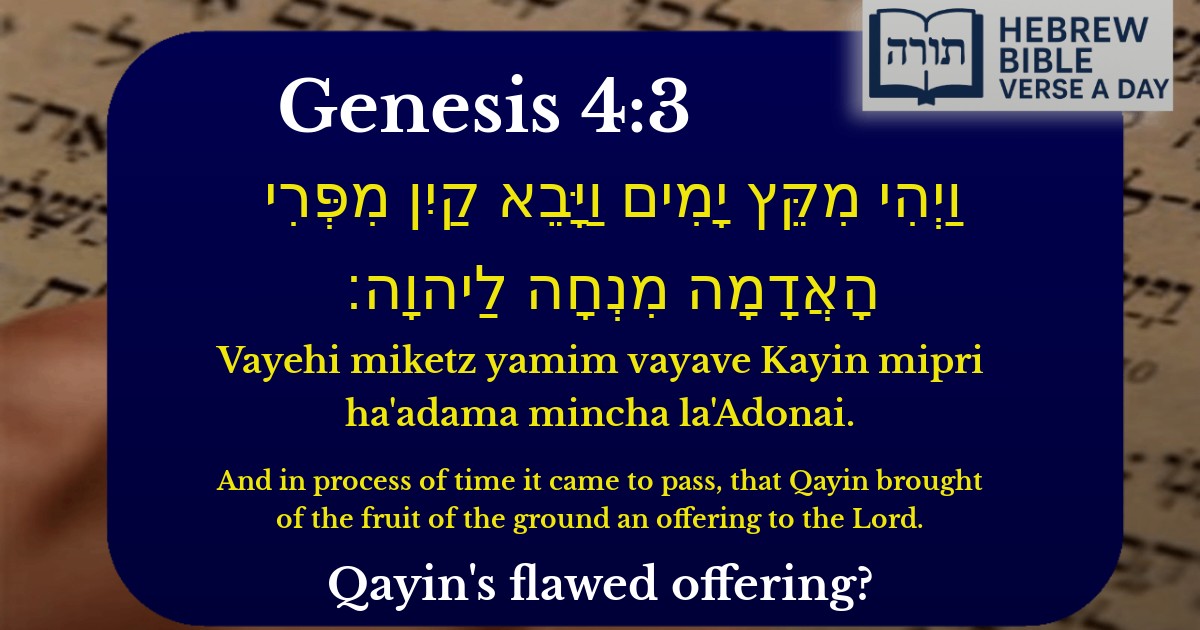Frequently Asked Questions
Q: What does Genesis 4:3 mean when it says Kayin brought an offering?
A: Genesis 4:3 describes Kayin (Cain) bringing an offering (mincha) to Hashem from the fruits of the ground. According to Rashi, this was an agricultural offering, but the verse hints at a problem - it doesn't specify that Kayin brought his best produce, unlike his brother Hevel (Abel) who is later described as bringing the choicest of his flock (Genesis 4:4).
Q: Why is Kayin's offering important in the Torah?
A: Kayin's offering is important because it teaches us about proper intentions in serving Hashem. The Midrash (Bereshit Rabbah 22:5) explains that Kayin brought inferior produce, showing his lack of wholeheartedness. This contrasts with Hevel's offering and teaches that when we give to Hashem, we must give our best with proper devotion.
Q: What can we learn from Kayin's offering in Genesis 4:3?
A: We learn that the quality and intention behind our mitzvot matter greatly. The Rambam (Hilchot Issurei Mizbe'ach 7:11) teaches that offerings must be from the finest available. Kayin's casual approach teaches us that religious acts require proper preparation and sincerity, not just going through the motions.
Q: How does the concept of offerings in Genesis 4:3 apply today?
A: While we no longer bring physical offerings, the principle applies to how we perform mitzvot and give tzedakah today. Just as Kayin should have brought his best produce, we must perform mitzvot with our best effort and give charity from our finest possessions, not just what's leftover (Shulchan Aruch, Yoreh De'ah 248:1).
Q: Why does the Torah mention 'the fruit of the ground' specifically?
A: The phrase 'fruit of the ground' is significant because, as Rashi notes, it implies Kayin brought flax or inferior produce (from which nothing grows), while Hevel brought from live animals that could reproduce. This shows Kayin lacked generosity and foresight in his offering, teaching us to consider the impact and quality of what we dedicate to holy purposes.


The Timing of Kayin's Offering
The verse begins with "וַיְהִי מִקֵּץ יָמִים" ("And in process of time"), which Rashi explains refers to the end of the year—specifically, the harvest season. This timing is significant because it indicates that Kayin (Cain) waited until he had gathered the fruits of his labor before bringing an offering. The Midrash (Bereshit Rabbah 22:4) contrasts this with Hevel (Abel), who brought the choicest of his flock immediately, demonstrating greater enthusiasm in serving Hashem.
The Nature of Kayin's Offering
Kayin brought "מִפְּרִי הָאֲדָמָה" ("of the fruit of the ground"), but the verse does not specify that it was the best of his produce. Ramban (Nachmanides) notes that the Torah emphasizes Hevel's offering as "מִבְּכֹרוֹת צֹאנוֹ וּמֵחֶלְבֵהֶן" ("from the firstlings of his flock and from their fat"), indicating superior quality, whereas Kayin's offering lacked such distinction. This suggests a lack of wholeheartedness in Kayin's worship.
The Spiritual Deficiency in Kayin's Offering
The Talmud (Menachot 110a) teaches that offerings must be given with proper intent (כַּוָנָה). The Midrash (Tanchuma, Bereshit 8) elaborates that Kayin's offering was rejected because it was given grudgingly or without sincerity. Additionally, the Kli Yakar (R' Shlomo Ephraim of Luntschitz) suggests that Kayin brought leftover produce, whereas Hevel brought the choicest of his possessions, reflecting their differing attitudes toward divine service.
The Symbolism of the Earth's Produce
The fact that Kayin brought "מִפְּרִי הָאֲדָמָה" may also hint at a deeper spiritual flaw. The Sforno explains that the earth was cursed due to Adam's sin (Bereshit 3:17), and by offering its fruits, Kayin may have been attempting to atone for this indirectly. However, true repentance requires direct personal effort, as later emphasized by the prophets (e.g., "שׁוּבוּ עָדַי וְאָשׁוּבָה אֲלֵיכֶם," Malachi 3:7).
Lessons for Divine Service